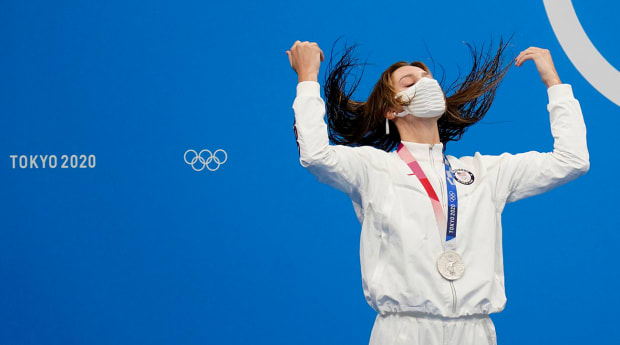Alex Walsh and Kate Douglass grabbed medals in the 200 IM to show that U.S. Swimming hasn't lost its edge.
TOKYO – They enter the Olympic pool from eight lanes on one end, but also from all over the U.S. (Even Alaska, apparently). So it was not surprising Wednesday when a pair of fresh 19-year-olds walked off the USA Swimming assembly line and onto the medal podium. But it was still damn impressive.
The day before, Alex Walsh had been doubled over in hallway at Tokyo Aquatics Center, looking like she might break. One consolation is that she has looked like that before. In the moment, it looks like she can’t handle the pressure. But more likely, that is how she handles the pressure.
Another consolation came from that joy and bane of modern life: the phone. It is the only way for most athletes here to talk to loved ones, and Walsh needed it desperately.
“Last night, I was really struggling,” Walsh said, a mere 12 hours and one silver medal later. “I had seen a lot of my friends medal. You know that the whole United States is kind of watching you. That can definitely get to you. But I think for me, (at) Trials, I kind of, like, learned how to deal with that. I called my parents. I called some of my friends. Just wanted to talk to them—kind of vent and also help them get my mind off the race.”

One crucial word there: Trials. That vaunted American crucible sharpens many of the best swimmers in the world. Sometimes qualifying for the Olympics is even harder than medaling at them. By the time Walsh and her fellow University of Virginia Cavalier Kate Douglass stepped onto the blocks for the 200 individual medley final, they knew they were as ready as they could possibly be: mentally, physically, strategically.
Douglass said later, “We all knew it was going to come down to the last 50 [meters] in the race.” At the halfway point, Walsh was third and Douglass was sixth. After the third leg, the breaststroke, Walsh was in first, 0.7 seconds ahead of Japan’s Yui Ohashi, and Douglass was fourth. Ohashi would win gold, but Walsh and Douglass earned silver, bronze and a confidence boost.
“I'm really excited for the rest of my career, having now this meet under my belt,” Walsh said. “I think it takes the pressure off, but also I think I realize that I haven't reached the limit yet.”
Nobody outside of the United States wants to hear that. But the Americans just keep coming and coming. There are Walsh and Douglass and Lydia Jacoby, the Seward, Alaska native who upset Lilly King in the 100 breaststroke—and there are still King and Katie Ledecky and Caeleb Dressel.
The American swimming culture keeps feeding itself. That makes it sound far easier than it is, but it is still true.
Walsh said after she recovered from her jittery Tuesday evening, “I actually fell asleep really quickly. My perspective going into this race was unlike any other I've had. I just felt like really calm. This summer has been really hard, dealing with the nerves. I know that I was feeling a lot of pressure, just from myself wanting to win a medal for USA. I think a lot of the other youngsters are feeling the same way.”
As of this writing, the U.S. has 16 swimming medals. That is as many as the next three countries combined: Australia (9), Great Britain (4), and Japan (3). The U.S. has had a few disappointments—Ledecky failing to medal in the 200 free; Ryan Murphy settling for bronze in the 100 back; the Americans’ failure to medal in the 4x200 free. But the overall performance remains the envy of the rest of the world, and the Americans aren’t done yet.
“We all feed off each other's successes,” Douglass said, “and I think it's just showing that there's a great future for USA Swimming out there.”
Any disappointment is excruciating for individuals. But the American team remains dominant, with new names and faces contributing every cycle. Douglass summed up the 200 IM simply: “It was Alex and I’s chance to do that together.” The two 19-year-olds seized that chance. Some American always does.
More Olympics Coverage:
• The USWNT's Off-Brand Olympics
• Sue Bird Seeks Historic Fifth Olympic Gold Medal in Tokyo
• Fencing’s Rich History With the Grisly—But Dignified!—Art of Dueling
• Simone Biles, Naomi Osaka Signal New Era of Prioritizing Mental Health
Sign up for our free daily Olympics newsletter: Very Olympic Today. You'll catch up on the top stories, smaller events, things you may have missed while you were sleeping and links to the best writing from SI’s reporters on the ground in Tokyo.